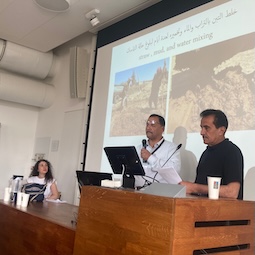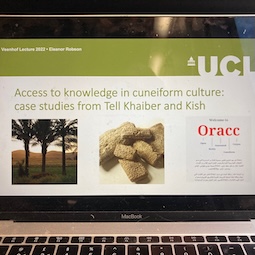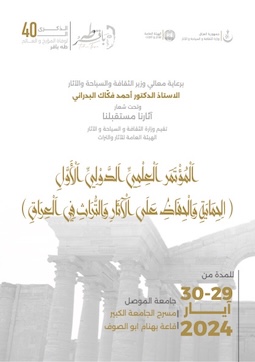Events and Publications
Over the course of the project, we have presented our work in progress at numerous events. Several open access publications are currently in development and will appear in the course of 2026.
Academic talks by Professor Eleanor Robson
- Access to knowledge in cuneiform culture: case studies from Tell Khaiber and Kish
Veenhof Lecture [https://www.nino-leiden.nl/event/veenhof-lecture-access-to-knowledge-in-cuneiform-culture], Netherlands Institute for the Near East and the National Museum of Antiquity, 2 December 2022
The recently excavated Iraqi marshland site of Tell Khaiber has yielded nearly 150 cuneiform tablets of the Sealand period (ca. 1730-1460 BCE), all documented in situ. By contrast, the northern Babylonian city of Kish, dug on a large scale in the nineteenth and early twentieth centuries, has produced many thousands of decontextualised tablets that have rarely been studied systematically. In this talk I drew on my recently completed editorial work for the Ur Regional Archaeology Project, and a collaboration just beginning for the Nahrein Network, to ask: What can those two very different assemblages of historical evidence tell us about how written knowledge was transmitted and accessed in antiquity, and the practices and ethics of Assyriological publication and communication today?
- Restoring the house of Kish: Reparative history, knowledge repatriation and heritage management in southern Iraq
World History Seminar [https://www.hist.cam.ac.uk/event-series/world-history], University of Cambridge Faculty of History, 12 October 2023
"To turn the house of Kish, which was like a haunted town, into a living settlement again: its king, the shepherd Ur-Zababa, rose like the over the house of Kish". In classical Sumerian literature of the early second millennium BC, the great city of Kish, Babylon's near neighbour, was already renowned for its long history of repeated dominance and collapse. In fact it continued to be inhabited, and sporadically powerful, well into the first millennium of the common era. Then, after centuries of abandonment, in the mid-19th century European antiquarian explorers and their agents started to dig through the ruin mounds in search of collectibles for export to western museums and the Ottoman capital, Istanbul. In Mandate Iraq, between 1924 and 1932, British authorities licensed a large-scale archaeological-anthropological expedition to Kish that wrought huge destruction.
Meanwhile, ninety years later, the Iraqi State Board of Antiquities and Heritage (SBAH) is left with an unmanageable and collapsing heritage site, without access to portable remains dispersed across the globe and published in many languages except Arabic. This story is not unique to Kish, nor even to Iraq. How do we move beyond the mapping the patterns of dispersal, appropriation and neglect, to do truly reparative history, in a context where artefact repatriation is neither feasible nor sufficient? In a new collaboration between SBAH and the Nahrein Network at UCL and the Ashmolean Museum, we are beginning to explore how to recover, reclaim, and put to useful work some of the historical knowledge of Kish that has been lost to Iraq over the past two centuries.
- Knowledge repatriation and the written heritage of ancient Iraq
First Scientific Conference of the Iraqi State Board of Antiquities and Heritage, University of Mosul, 30 May 2024
In this talk I introduced the concept of "knowledge repatriation" and explained how it relates to the written heritage of ancient Iraq. I described the problem it addresses, using the archaeological site of Kish as a case study, and some of the long-term, often intractable consequences of that problem. Finally, as a non-Iraqi, I suggested these ideas could open a dialogue about how we can collaborate, through the State Board of Antiquities and Heritage, and through Iraq's universities, to make knowledge repatriation not just a concept but a useful and effective practice.
A lightly edited version of this talk is reproduced on the Knowledge Repatriation page of this website.
- Bidirectional script functionality: opening Oracc to Middle Eastern users
69th Rencontre Assyriologique Internationale [https://www.helsinki.fi/en/conferences/69th-rencontre-assyriologique-internationale], Workshop: Digital and Open Assyriology, University of Helsinki, 10 July 2024
Since its inception in 2010, Oracc has always aimed to be as Open as possible, in as many ways as possible. Over the past few years, working with the Nahrein Network and the Ad- vanced Research Computing team at University College London, we have been updating our tools and resources to accommodate users of right-to-left scripts such as Arabic and Hebrew. In this talk I demonstrated our progress so far, framed in a wider discussion of the ethics and practice of knowledge equity within the discipline. Finally, I asked what more we could and should collectively be doing to make Assyriology more welcoming and inclusive in the countries from which our source material originates.
Workshop: The Forgotten City of Kish: Local Perspectives [https://rai70.ff.cuni.cz/abstracts.php#W09]
70th Rencontre Assyriologique Internationale [https://rai70.ff.cuni.cz/index.php], Charles University, Prague, 8 July 2025
 [/kish/images/rai70-workshop-large.jpg]
[/kish/images/rai70-workshop-large.jpg]Some of the participants in the Kish workshop. Left to right: Dr Nadia Aït Saïd-Ghanem (seated); Dr Ahmed Azeez Selman; and Mr Raad Hamed Abdullah. Photo by Eleanor Robson.
The large archaeological site of Kish, 15 km northeast of Babylon, comprises the ruins of one of the greatest cities of ancient Babylonia. Since the mid 19th century, several international antiquarian and archaeological expeditions have worked there. Most of their finds were taken to museums in Paris, Istanbul, Oxford, and Chicago so it is now impossible to study them together, and few artefacts are in Iraq itself. The few archaeological and historical studies of Kish are mostly in French and English, not Arabic. Since 2021, the Nahrein Network's Kish Project at UCL has been working to recover lost archaeological and historical knowledge of Kish, and render it useful to local researchers and heritage professionals. As part of that effort, this workshop aimed to explore local perspectives on the ancient and modern history of the site.
- Mr Ashraf Al-Humairi, SBAH Babil Province: "The City of Kish Today"
- Since the archaeological site of Kish was rediscovered, scholarship has mostly viewed it as a land filled with ancient buildings whose presence promises the discovery of ancient artefacts. But Kish is also, and has always been, part of a lively community who lives nearby. For this community, Kish is part of their everyday environment. Tourists, both national and international, are also an important component of Kish's life today, with groups visiting all year round despite the lack of exposure and scholarly interest that this site and its ancient history have received. To present a local perspective of the site of Kish, I will first introduce the site within its environment, from the cultivated fields and palm groves that surround Tell Ingharra and Tell Uhaymir, to the wildlife that we, residents of Nile city, observe daily on site. I will then focus on the only remaining earthen building on Tell Ingharra, the temple of Ishtar, to present how SBAH hopes to rehabilitate it, from simply opening the site to visitors, to reclaiming the importance of and regenerating interest in Kish's ancient history.
- Dr Parsa Daneshmand, Wolfson College, University of Oxford: "The Kish Project: Online Translation of Cuneiform Texts into Arabic and Persian-Methods and Challenges"
- The Kish project represents a groundbreaking initiative in the online translation of cuneiform texts into Arabic and Persian. I joined this project as a postdoctoral researcher in November 2021. Using Nisaba, a cuneiform editor, I worked in London and Oxford to create an open-access multilingual catalogue and edition of cuneiform tablets from Kish. My focus was on tablets housed in the Ashmolean Museum, which include official and personal letters, administrative documents, literary works, and school exercises dating from the third to the first millennia BC. The project's aim is to translate these texts into English, Arabic, and Persian. In my talk, I will discuss the methods I used and the challenges I faced in the online translation of Akkadian and Sumerian texts into Arabic and Persian. These challenges include: 1. Accurately rendering personal names and technical terms using Arabic and Persian scripts 2. Developing techniques to represent precise pronunciations of names and words 3. Navigating the complexities of translating ancient texts into Arabic and Persian This project represents a significant step in making ancient Mesopotamian texts accessible to a broader audience, particularly in the Middle East. I will share insights from my experience.
- Dr Nadia Aït Saïd-Ghanem, Nahrein Network, UCL: "Baghdad's Antiquities Dealers and Cuneiform Tablets from Kish"
- When Kish began to be excavated by the French archaeologist Henri de Genouillac in 1911-1912, cuneiform tablets from Tell Uhaymir were already in circulation since 1910 through antiquities dealers based in Baghdad and Paris, showing that the site was being explored by local teams since late 1910 at least. Archaeological artefacts from Kish also continued to be offered for sale by dealers after de Genouillac's departure, and up to 1935, two years after the official end of the OFME (Oxford and Field Museum Expedition) mission. Again, proof that archaeological activities continued locally. Based on correspondence between antiquities dealers and museum curators, this presentation will delve into who was involved in trading cuneiform tablets and ancient artworks from Kish, to reconstruct a timeline of explorations of the site led by Iraqis.
- Mr Raad Hamed Abdullah, "Clay and Its Uses in Ancient and Modern Iraq"
- For millennia, clay has played a fundamental role in Iraq's history, and today it still holds a special place. To present how this material continues to be used in Iraq, this discussion will begin by introducing the different ways in which clay was used to build palaces, temples and private homes based on archaeological evidence, with a focus on ancient earthen buildings at Kish such as the temple of Ishtar. Then, I will present how clay is used today, from the manner in which this material is made and prepared taking into account the challenges of climate change, to examining the constructions themselves, such as residential homes, and gardens.
- Dr Ahmed Azeez Selman, SBAH Babil Province: "Terracotta from Ancient Kish"
- Investigation, excavations results and pertinent academic studies have shown the significance of the city of Kish from its geographical, religious and political aspects. The archaeological excavations results in Kish city encompassed a variety in architecture and different artifacts, one of them were the terracotta. In this paper we will try to shed light on general features that include artistic characteristics, themes, contents, and different iconography, as they reflect through their artistic representation an aspect of the traditions and some daily religious and secular activities that were prevalent during a certain era or time period within the civilizational sequence witnessed by the city of Kish. We will briefly discuss various examples of terracotta dating back to the ages and civilized periods which were witnessed by the city of Kish, taking into consideration their importance in terms of artistic characteristics as well as their various themes, and the purposes for which they were made.
- Prof. Eleanor Robson, Nahrein Network, UCL: "The Forgotten Workers of Kish: The Daily Life of Archaeological Labour in Early 20th-Century Hillah"
- What was the experience of excavation like for Iraqi archaeological workers in the first decades of the 20th century? Although they rarely left records themselves, the accounts of European and Americans fieldworkers are often unintentionally revealing, and we can contextualise them within broader studies of colonial attitudes and infrastructures of control in Ottoman and Mandate Iraq. As historian Zeynep Çelik (2016) showed in her sensitive study of archaeological labour in the late nineteenth-century Ottoman empire, through "reading against the grain" it is indeed possible to "dismantle the lopsided assumptions and disrupt the position of the Western archaeologists deemed in charge". At first, it is tempting to categorise Iraqi fieldworkers as "doubly invisible" technicians, in the terminology of sociologist Steven Shapin (1989): largely invisible to those who employed them, and therefore also to posterity, as if there were "no persons involved in the production of science but the stipulated authors". However, as I shall argue on the basis of research conducted for the Nahrein Network, in the case of Kish, while Western archaeologists were increasingly reticent about their large teams and their expertise in official reports, their colleagues in anthropology rendered many of those same men all too visible in academic publication. How, therefore, should we balance our duty as a discipline to recover the often brutalising experience of the adults and children whose effort and skills generated the material evidence on which we still depend, while treating them with dignity and respect? These are not easy questions to answer, but they certainly deserve to be asked.
Forthcoming open access publications
Robson, Eleanor, Knowledge Repatriation and the Written Heritage of Ancient Iraq (Cambridge Elements in Critical Heritage Studies [https://www.cambridge.org/core/publications/elements/critical-heritage-studie]), Cambridge: Cambridge University Press. Arabic translation by Selwa Kazwini.
Robson, Eleanor (ed)., "The forgotten city of Kish: local perspectives", special section of IRAQ [https://www.cambridge.org/core/journals/iraq] 87 (2026), comprising:
- Robson, Eleanor, "Introduction/editorial"
- Daneshmand, Parsa, "The Kish Project: Online Translation of Cuneiform Texts into Arabic and Persian-Methods and Challenges"
- Selman, Ahmed Azeez, "Terracotta from Ancient Kish"
- Saïd-Ghanem, Nadia Aït, "Baghdad's Antiquities Dealers and Cuneiform Tablets from Kish"
- Robson, Eleanor, "The Forgotten Workers of Kish: The Daily Life of Archaeological Labour in Early 20th-Century Hillah"
25 Sep 2025
Eleanor Robson
Eleanor Robson, 'Events and Publications', The Forgotten City of Kish • مدينة كيش المنسية, The Kish Project, 2025 [http://oracc.org/Aboutthisproject/Eventsandpublications/]

